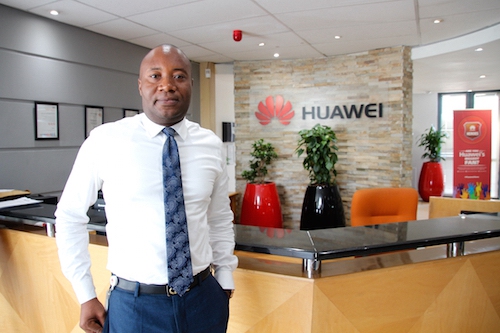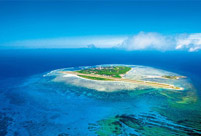

 |
| Dr Bello Moussa, Head of the Strategic Partnerships and New Technologies Department in Huawei SA. (PEOPLE’S DAILY ONLINE/SISSY CHEUNG) |
WITH the only impression of China created from kung-fu movies and Chinese characters in his childhood, Dr Bello Moussa would never have imagined himself spending more than a decade living in China, being employed by a Chinese multinational and heading back to his native land as a telecommunications professional.
Dr Moussa was born in Cameroon, moved to Saudi Arabia where he started his tertiary education, and finished it in Bangladesh. He went to China in early 2000 to pursue his Master’s degree and PHD in telecommunications, and joined China’s telecommunication giant Huawei after graduating in July 2006, spending five years working in its Shenzhen headquarters. He achieved all of this, notwithstanding the culture and language barriers, in his adopted country.
Serving more than one third of the world’s population, Huawei’s innovative information communications technology (ICT) solutions, products and services have been deployed in more than 170 countries and regions, with more than 170,000 employees worldwide.
Driven by customer-centric innovation, Huawei has established an ICT solutions portfolio that gives customers competitive advantages in telecom and enterprise networks, devices and cloud computing.
Huawei offered Dr Moussa the job after he had worked on some projects for the company with his supervisor in the laboratory at the university.
Dr Moussa spoke of the differences between being a student and working for a company in China. “As a student you are pampered, you can do whatever you want. People would still cater to you — but when you are a worker, things are different.”
His case was even more unique. His previous experience studying in China became his advantage when as the first foreigner to join the company, he was treated exactly the same as Chinese staff, which meant that workload and regulations governing Chinese staff also applied to him.
“Part of it was because I could speak the language. I blended in. I could attend meetings and I could travel and have fun. That helped me a lot,” said Dr Moussa.
However, it still took him a while to adapt to an enterprise governed by Chinese culture while Huawei particularly enjoys the fame of its workload and inspiriting mechanism.
“If you are in a project with a team and some stay behind late to work, you feel bad to leave and go home.”
Dr Moussa spoke about their team perception. “What I really appreciate in Huawei is that you are part of the team. Your joy, your sorrow, your success and your failure are all shared with your colleagues.”
This peer influence and hardworking experience has influenced Dr Moussa. People may quarrel, argue with each other over a project but it’s not about any particular person and when they receive a satisfying result, they will congratulate you and you will see the reward.
It is also a Huawei policy that at a certain point in time, you need to have frontline experience because that’s where the soldiers are. Dr Moussa was initially employed to handle research for road-map evaluation of Huawei’s products as a part of product management within the radio and wireless product line, which is more technology orientated compared to his current work in SA.
He transferred to SA in November 2011 in a new direction of work, mainly dealing with partnerships with different industry organisations. “Basically it’s for promoting the new technologies, such as 4.5G and 5G. We are interacting a lot with African governments, third-party consultants and all the major players in the industry such as operators,” said Dr Moussa.
In 2014, he was appointed as the Director of Strategic Partnership and New Technologies.
Acting as the intermediary between Huawei’s clients and technical teams, Dr Moussa needed to do almost everything on the frontline. “When you mention Huawei, most people think it’s just selling phones, while we are doing a lot more. This department is here to promote awareness about what Huawei is and what it does.”
Huawei entered the African market in 1998 and has been dedicated to connecting Africa with the most innovative ICT solutions. Telecom networks supplied by Huawei are deployed in more than 50 countries on the continent. Up to the end of 2015, Huawei has more than 7,000 employees in Africa, 70% of whom are recruited locally.
SA is one of the most important African markets for Huawei, with more than 1,100 employees providing a telecom network service to almost 40-million people.
Staying in Africa enables Dr Moussa to bring more value to the company because he fully understands both the local and the company culture and he is able to bring the two together. “When locals are recruited to my team, I sit with them and I tell them how different the Chinese culture or Huawei culture is from their culture,” he said.
He has to manage high expectation from both sides and sometimes finds himself stuck in the middle. There are conflicts at times. So he always strives to find a balancing point.
“I try to encourage them to communicate to find solutions, I also tell my Chinese colleagues to blend in. Instead of going to a Chinese canteen, we can all go to Nando’s and eat together.”
As representatives of the Huawei regional office in eastern and southern Africa, the team also travels to various countries such as Angola, Mozambique, Tanzania, Uganda, Kenya, Mauritius and Madagascar. “It is true that the cultures of African countries are different from one to another. We observe them and we learn. That’s my rule. There are some sensitive topics that you need to avoid, like politics and religion,” said Dr Moussa.
(The story was originally published on Business Day on May 4th, 2016.)
 Beijing Style: ready for bare legs
Beijing Style: ready for bare legs Century-old station sees railyway evolution
Century-old station sees railyway evolution Amazing scenery of Xisha Islands
Amazing scenery of Xisha Islands Enthusiasts perform Kung Fu at Wudang Mountain
Enthusiasts perform Kung Fu at Wudang Mountain Stunning photos of China's fighter jets in drill
Stunning photos of China's fighter jets in drill Monk's mummified body to be made into a gold Buddha statue
Monk's mummified body to be made into a gold Buddha statue Asia's longest and highest suspension bridge to open to traffic
Asia's longest and highest suspension bridge to open to traffic China's first interactive robot looks like a beauty
China's first interactive robot looks like a beauty Vietnamese Su-30 fighters fly over Nanwei Island in South China Sea
Vietnamese Su-30 fighters fly over Nanwei Island in South China Sea Top 20 hottest women in the world in 2014
Top 20 hottest women in the world in 2014 Top 10 hardest languages to learn
Top 10 hardest languages to learn 10 Chinese female stars with most beautiful faces
10 Chinese female stars with most beautiful faces China’s Top 10 Unique Bridges, Highways and Roads
China’s Top 10 Unique Bridges, Highways and Roads Unpredictable Trump could swing either way on China
Unpredictable Trump could swing either way on China Military institution scandal highlights shady Putianese private clinics
Military institution scandal highlights shady Putianese private clinics How to maintain property in communist system looms large as land warrants expire
How to maintain property in communist system looms large as land warrants expire Yiwu, China’s wholesale capital, switches its economic growth engine from manufacturing to design
Yiwu, China’s wholesale capital, switches its economic growth engine from manufacturing to designDay|Week